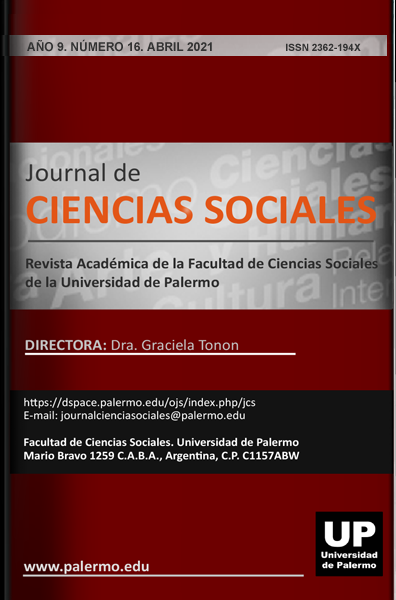Abordaje en Comenzar de Nuevo de los TCA durante la pandemia
Retos y Oportunidades
Abstract
Estamos por cumplir un año que se declaró la Emergencia Sanitaria Nacional por la pandemia de covid-19. Todos nos hemos visto afectados de alguna manera, pero quienes trabajamos con pacientes que padecen trastornos de la conducta alimentaria, una población particularmente vulnerable, hemos sido testigos del gran impacto que esta crisis global ha traído a sus vidas. El trastorno de la conducta alimentaria y la pandemia de covid-19 se han combinado para traer la tormenta perfecta. Las alteraciones en las rutinas diarias, como por ejemplo de compra o consumo de víveres, de sueño o de ejercicio, el miedo a enfermar, la incertidumbre, la previa mala relación con la comida en una época de inseguridades alimentarias o de compras exageradas de pánico, además del aislamiento inherente a los esfuerzos de distanciamiento social y la vulnerabilidad económica agregada, han venido a imponer todavía más obstáculos en el acceso a tratamiento, el sostenimiento de las redes de apoyo y a incrementar importantemente la sintomatología alimentaria y de ansiedad de quienes los padecen. El impacto en los centros de atención a pacientes con estas enfermedades ha sido mayúsculo, y tanto consultantes, como familiares y profesionales se han tenido que ir adaptando a intervenciones virtuales e híbridas para poder sostener el nivel de atención.
Downloads
References
Anastasiadou, D., Folkvord, F. y Lupiañez-Villanueva, F. (2018). A systematic review of mHealth interventions for the support of eating disorders. European Eating Disorders Review, 26(5), 394-416. https://doi.org/10.1002/erv.2609
Bauer, S. y Moessner, M. (2013). Harnessing the power of technology for the treatment and prevention of eating disorders. International Journal of Eating Disorders, 46(5), 508–515. https://doi.org/10.1002/eat.22109
Ertelt, T. W., Crosby, R. D., Marino, J. M., Mitchell, J. E., Lancaster, K. y Crow, S. J. (2011). Therapeutic factors affecting the cognitive behavioral treatment of bulimia nervosa via telemedicine versus faceto-face delivery. International Journal of Eating Disorders, 44(8), 687–691. https://doi.org/10.1002/eat.20874
Graell, M., Morón-Nozaleda, M. G, Camarneiro, R., Villaseñor, Á., Yáñez, S., Muñoz, R., Martínez-Núñez, B., Miguélez-Fernández, C., Muñoz, M. y Faya, M. (2020). Children and adolescents with eating disorders during COVID-19 confinement: Difficulties and future challenges. European Eating Disorders Review, 28(6), 864-870 https://doi.org/10.1002/erv.2763
Hambleton, A., Le Grange, D., Miskovic-Wheatley, J., Touyz S., Cunich M. y Maguire S. (2020). Translating evidence-based treatment for digital health delivery: a protocol for family-based treatment for anorexia nervosa using telemedicine. Journal of Eating Disorders, 8. https://doi.org/10.1186/s40337-020-00328-x
Mitchell, J. E., Crosby, R. D., Wonderlich, S. A., Crow, S., Lancaster, K., Simonich, H., … Myers, T. C. (2008). A randomized trial comparing the efficacy of cognitive-behavioral therapy for bulimia nervosa delivered via telemedicine versus face-to-face. Behavior Research and Therapy, 46(5), 581–592. https://doi.org/10.1016/j.brat.2008.02.004
Orgilés, M., Morales, A., Delvecchio, E., Mazzeschi, C. y Espada, J. (2020). Immediate psychological effects of the COVID-19 quarantine in youth from Italy and Spain. Front Psychol. 10.3389/fpsyg.2020.579038
Our World in Data. Coronavirus (COVID-19) Deaths. Statistics and Research https://ourworldindata.org/covid-deaths
Shaw, H., Robertson, S. y Ranceva, N. (2021). What was the impact of a global pandemic (COVID-19) lockdown period on experiences within an eating disorder service? A service evaluation of the views of patients, parents/carers and staff. Journal of Eating Disorders 9(14). https://doi.org/10.1186/s40337-021-00368-x
Unikel, C., Sanchez, M., Trujillo, E., Bauer, S. y Moessner, M. (2015). Internet-based aftercare program for patients with bulimia nervosa in Mexico - A pilot study. Revista Mexicana de Trastornos Alimentarios, 6(1), 64-69. http://dx.doi.org/10.1016/j.rmta.2015.05.004
Weissman, R. S., Bauer, S. y Thomas, J. J. (2020). Access to evidence‐based care for eating disorders during the COVID‐19 crisis. International Journal of Eating Disorders, 53(5) 639-646. https://doi.org/10.1002/eat.23279
Wick, M. R., Keel, P. K. (2020). Posting edited photos of the self: Increasing eating disorder risk or harmless behavior? International Journal of Eating Disorders, 53(6), 864-872. https://doi.org/10.1002/eat.23263
The authors retain the rights to their work guaranteeing this journal the right of first publication, committing to cite the Journal of Social Sciences as a reference of the original publication.
The works published in the Journal are published under the terms indicated in the Creative Commons License with the International Attribution 4.0 (CC BY 4.0).




























